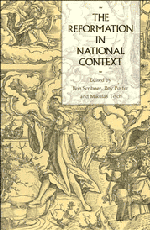9 - Hungary
Published online by Cambridge University Press: 04 December 2009
Summary
The Reformation reached Hungary at a time of fairly general interest in the affairs of the Church, whether religious or temporal. The many beautiful tryptych altarpieces dating from the first two decades of the sixteenth century are the most conspicuous reminders of this interest. Nowadays they are cherished treasures preserved in museums, but they were originally shrines of religious worship erected in church buildings all over the country. Commissioned by lay patrons or by guilds, their great number and rich adornment attests the generosity of secular social strata towards the Church. At the same time, by depicting sacred subjects in everyday surroundings, these altarpieces indicate the laity's desire to see themselves as participants in the mystery experienced when attending religious worship. Although the devotio moderna did not establish any communities in Hungary, the demand for a more personalised religious experience was apparent. Whole families took lay orders with the aim of sharing in ‘the abundance of consolation and attaining the rewards of eternal life more comfortably and more fortunately’, as one prior put it in 1521.
The all-embracing interest in personal religiosity is also witnessed by women's lively concern with it. Magnates' wives founded cloisters or donated chasubles, while well-educated nuns such as Lea Raskai in the 1510s and 1520s composed lives of the saints and copied them into codices for use in nunneries.
- Type
- Chapter
- Information
- The Reformation in National Context , pp. 155 - 167Publisher: Cambridge University PressPrint publication year: 1994
- 4
- Cited by



